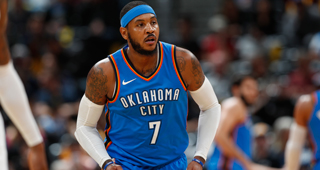A couple weeks ago, I wrote about Dwight Howard more or less officially outliving his usefulness. He’ll probably kick around the NBA for a few more years, pulling down boards and spectacularly alienating teammates, but getting traded to and immediately bought out by the Nets is firmly the mark of a player whose value to the broader league-wide narrative has pretty well bottomed out. If we’re talking about the Skittle God six months from now, it’s more likely that it has something to do with John Wall trying to strangle him with a balloon animal than Dwight’s on-court performance.
Carmelo Anthony is close to joining Howard in the Irrelevant Former Star bin, putting up twenty empty points per night for the Pistons or whatever, but he hasn’t arrived there just yet. He was traded on Wednesday to the Atlanta, which is the first step in him eventually, after some haggling over how much the Hawks are willing to pay him not to play for them next season, joining the Rockets on a minimum contract. This is a big deal because he’s Carmelo Anthony—one of the great scorers of his era, six All-NBA teams, Banana Boat Vice Admiral, etc.—but he’s also 34 and, like his colleague in luxurious washed-ness Dwyane Wade, is simply not the sort of aging player who seems particularly invested in driving himself to the extreme lengths of labor and abstemiousness it takes to stay exceptional past his athletic peak. Whenever Melo officially joins the Rockets, there won’t be any honest talk of a new Big Three forming or claims that this puts them over the top in their ongoing battle against the Warriors. Their star forward will be a star only in the Lohanian sense: people know the name based on good work done a while ago.
The most urgent question surrounding Melo’s Rockets move is whether he’ll help them at all, or perhaps even make them worse. The reputation of offense-first players who aren’t James Harden-level cornerstones has taken a hit in recent years as teams have typically gravitated more toward rangy athletes than slow-footed shooters or defensively challenged big men. The thinking goes that if you’ve got a guy who can defend Jimmy Butler and do a serviceable job when he switches onto Jeff Teague, he only needs to learn to do a couple things on the other end of the floor to become a highly useful player. For whatever reason, the inverse doesn’t work as smoothly: lousy defenders who get buckets rarely reform. This probably has something to do with the fact that, historically speaking, prolific scoring has gotten players paid. Jabari Parker isn’t altogether wrong about that, though he would’ve been a lot more correct in 2012.
Nobody expects Carmelo Anthony to change. Mike D’Antoni could expect him to come off the bench, which Melo dismissed out of hand in Oklahoma City but might have to accept as a reality in Houston. What he can offer, in whatever role he assumes, for however many minutes per game, is a timeworn version of what he always has, which is to say the ability to take over a game for a few minutes. It’s less reliable, less regular than it has ever been, but it exists—problematically, more strongly in Melo’s head than in reality. He can shoot threes okay. He’s stronger than most of the players who guard him, so he can bully them into the paint. He doesn’t need to hoard the ball to score, though he obviously prefers to. This is about it, as far as his list of strengths goes. It wasn’t longer five years ago, but it could be described in more enthusiastic terms. His defense throughout his career has been bad. It’s now perpetually abysmal.
This hurts to ask: Houston would rather have kept Trevor Ariza than signed Melo, right? The money being equal, which it obviously isn’t. Because the Suns lavished Ariza with an oversized contract, the Rockets have swapped a good defender who spaces the floor and doesn’t ask questions to a matador who says, not a little haughtily, he knows that [he] still [has] so much left in the tank and bring[s] so much to the game of basketball. D’Antoni’s boys were second in the league in offensive efficiency last year. Harden won an MVP on the back of creating more than fifty points per game for himself and his teammates. This is not a squad that needs ball-dominant scoring punch so much as a cast that props up Harden and Chris Paul and hits open shots when they’re passed to. Clint Capela, for instance, is a perfect fit. Melo—it’s not like he doesn’t have anything left to give, but he’s never had to blend in, nor has he ever demonstrated a willingness to do so.
It would be wonderful, especially for folks who defended Carmelo in his prime, if he could find a way to make it work in Houston. He’s a generational talent who hasn’t totally gotten his due because of the mediocre teams he played for during his prime. (Which is his fault and not. The Knicks underserved him, but he didn’t have to stick around after they did.) Now he has finally, through a circuitous and mildly humiliating path, landed on a title contender. Ideally, he would appreciate that enough to do some self-examining and strongly consider what he can do for the Rockets, even if it’s not exactly what he’d like to. But he’s a prideful and stubborn guy who has seemed to come out the other end of his disappointing season with the Thunder more grumpy than reflective. If there’s something that can shake him from this state, it’s the stakes he’ll be staring down once he signs with Houston. And if that fails to humble Melo, nothing else will.



